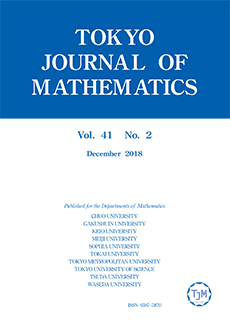Abstract
We discuss the Hausdorff dimension of certain sets related to Diophantine approximations over an imaginary quadratic field $\mathbb{Q}(\sqrt{d})$. We show that, for an infinite subset $\mathcal{A}$ of $\mathbb{Z}[\omega] \backslash \{0\}$, the set of $z \in \mathbb{C}$ with $|z-a/r| < 1 / |r|^{1+\rho}$ having infinitely many solutions of $a \in \mathbb{Z}[\omega]$ and $r \in \mathcal{A}$ with some $\rho > 0$ has Hausdorff dimension $2(1+\gamma) / (1+\rho)$, where $\gamma$ is the sup of $h$ such that $\sum_{r \in \mathcal{A}} 1/(|r|^{2})^{h}$ diverges. This result is a version of a result by G. Harman for complex numbers without the coprime condition. In particular, this result implies a version of the classical Jarnik-Besicovitch result when we take $\mathcal{A} = \mathbb{Z}[\omega]\backslash\{0\}$. We also discuss the Hausdorff dimension of the set of complex numbers which have infinitely many solutions to the Diophantine inequality concerning the Duffin-Schaeffer conjecture over $\mathbb{Q}(\sqrt{d})$.
Citation
Zhengyu CHEN. "On Hausdorff Dimension of Certain Sets Arising from Diophantine Approximations for Complex Numbers." Tokyo J. Math. 39 (2) 441 - 458, December 2016. https://doi.org/10.3836/tjm/1484903132





